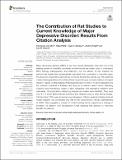Files in this item
The contribution of rat studies to current knowledge of major depressive disorder : results from citation analysis
Item metadata
| dc.contributor.author | Carvalho, Constança | |
| dc.contributor.author | Peste, Filipa | |
| dc.contributor.author | Marques, Tiago A. | |
| dc.contributor.author | Knight, Andrew | |
| dc.contributor.author | Vicente, Luís M. | |
| dc.date.accessioned | 2020-08-12T14:30:02Z | |
| dc.date.available | 2020-08-12T14:30:02Z | |
| dc.date.issued | 2020-07-14 | |
| dc.identifier | 269564032 | |
| dc.identifier | 3df8ffea-6865-4a0a-9a46-11607e088dfd | |
| dc.identifier | 85088824571 | |
| dc.identifier | 000556413200001 | |
| dc.identifier.citation | Carvalho , C , Peste , F , Marques , T A , Knight , A & Vicente , L M 2020 , ' The contribution of rat studies to current knowledge of major depressive disorder : results from citation analysis ' , Frontiers in Psychology , vol. 11 , 1486 . https://doi.org/10.3389/fpsyg.2020.01486 | en |
| dc.identifier.issn | 1664-1078 | |
| dc.identifier.other | ORCID: /0000-0002-2581-1972/work/78891467 | |
| dc.identifier.uri | https://hdl.handle.net/10023/20452 | |
| dc.description | Funding: This study was financed by Animalfree Research—Switzerland, a grant from the Johns Hopkins Center for Alternatives to Animal Testing (CAAT) and by Portuguese National Funds through FCT—Fundação para a Ciência e a Tecnologia, within the CFCUL Unit funding UIDB/00678/2020. TM thanks partial support by CEAUL (funded by FCT—Fundação para a Ciência e a Tecnologia, Portugal, through the project UID/MAT/00006/2019). FP thanks FCT/MCTES for the financial support to CESAM (UIDP/50017/2020 and UIDB/50017/2020), through national funds. Open access publication costs were covered by Animalfree Research-Switzerland and by funding provided by the Ketty and Leif Hjordt Foundation. | en |
| dc.description.abstract | Major depressive disorder (MDD) is the most severe depression type and one of the leading causes of morbidity worldwide. Animal models are widely used to understand MDD etiology, pathogenesis, and treatment, but the efficacy of this research for patients has barely been systematically evaluated. Such evaluation is important given the resource consumption and ethical concerns incurred by animal use. We used the citation tracking facilities within Web of Science and Scopus to locate citations of original research papers on rats related to MDD published prior to 2013—to allow adequate time for citations—identified in PubMed and Scopus by relevant search terms. Resulting citations were thematically coded in eight categories, and descriptive statistics were calculated. 178 publications describing relevant rat studies were identified. They were cited 8,712 times. More than half (4,633) of their citations were by other animal studies. 794 (less than 10%) were by human medical papers. Citation analysis indicates that rat model research has contributed very little to the contemporary clinical understanding of MDD. This suggests a misuse of limited funding hence supporting a change in allocation of research and development funds targeting this disorder to maximise benefits for patients. | |
| dc.format.extent | 8 | |
| dc.format.extent | 334275 | |
| dc.language.iso | eng | |
| dc.relation.ispartof | Frontiers in Psychology | en |
| dc.subject | Animal models | en |
| dc.subject | Animal use alternatives | en |
| dc.subject | Citation analysis | en |
| dc.subject | Major depressive disorder | en |
| dc.subject | Rat | en |
| dc.subject | QH301 Biology | en |
| dc.subject | RC0321 Neuroscience. Biological psychiatry. Neuropsychiatry | en |
| dc.subject | Z665 Library Science. Information Science | en |
| dc.subject | Psychology(all) | en |
| dc.subject | NDAS | en |
| dc.subject.lcc | QH301 | en |
| dc.subject.lcc | RC0321 | en |
| dc.subject.lcc | Z665 | en |
| dc.title | The contribution of rat studies to current knowledge of major depressive disorder : results from citation analysis | en |
| dc.type | Journal article | en |
| dc.contributor.institution | University of St Andrews. School of Mathematics and Statistics | en |
| dc.contributor.institution | University of St Andrews. Scottish Oceans Institute | en |
| dc.contributor.institution | University of St Andrews. Centre for Research into Ecological & Environmental Modelling | en |
| dc.identifier.doi | 10.3389/fpsyg.2020.01486 | |
| dc.description.status | Peer reviewed | en |
This item appears in the following Collection(s)
Items in the St Andrews Research Repository are protected by copyright, with all rights reserved, unless otherwise indicated.

